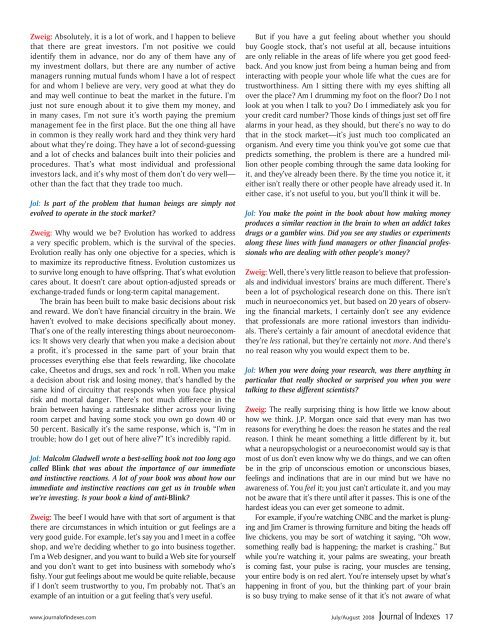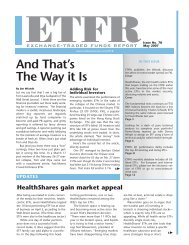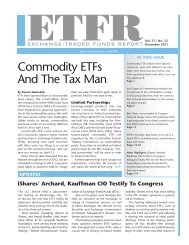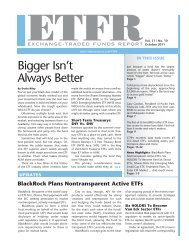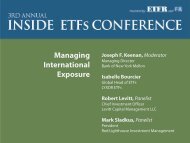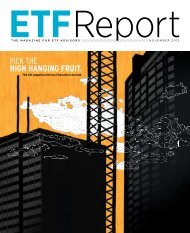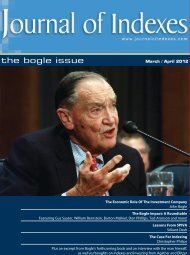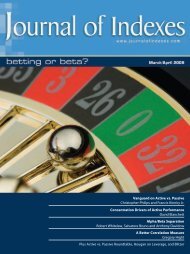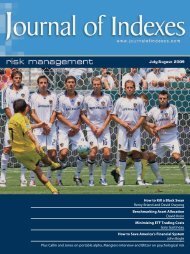Download - IndexUniverse.com
Download - IndexUniverse.com
Download - IndexUniverse.com
Create successful ePaper yourself
Turn your PDF publications into a flip-book with our unique Google optimized e-Paper software.
Zweig: Absolutely, it is a lot of work, and I happen to believe<br />
that there are great investors. I’m not positive we could<br />
identify them in advance, nor do any of them have any of<br />
my investment dollars, but there are any number of active<br />
managers running mutual funds whom I have a lot of respect<br />
for and whom I believe are very, very good at what they do<br />
and may well continue to beat the market in the future. I’m<br />
just not sure enough about it to give them my money, and<br />
in many cases, I’m not sure it’s worth paying the premium<br />
management fee in the first place. But the one thing all have<br />
in <strong>com</strong>mon is they really work hard and they think very hard<br />
about what they’re doing. They have a lot of second-guessing<br />
and a lot of checks and balances built into their policies and<br />
procedures. That’s what most individual and professional<br />
investors lack, and it’s why most of them don’t do very well—<br />
other than the fact that they trade too much.<br />
JoI: Is part of the problem that human beings are simply not<br />
evolved to operate in the stock market?<br />
Zweig: Why would we be? Evolution has worked to address<br />
a very specific problem, which is the survival of the species.<br />
Evolution really has only one objective for a species, which is<br />
to maximize its reproductive fitness. Evolution customizes us<br />
to survive long enough to have offspring. That’s what evolution<br />
cares about. It doesn’t care about option-adjusted spreads or<br />
exchange-traded funds or long-term capital management.<br />
The brain has been built to make basic decisions about risk<br />
and reward. We don’t have financial circuitry in the brain. We<br />
haven’t evolved to make decisions specifically about money.<br />
That’s one of the really interesting things about neuroeconomics:<br />
It shows very clearly that when you make a decision about<br />
a profit, it’s processed in the same part of your brain that<br />
processes everything else that feels rewarding, like chocolate<br />
cake, Cheetos and drugs, sex and rock ’n roll. When you make<br />
a decision about risk and losing money, that’s handled by the<br />
same kind of circuitry that responds when you face physical<br />
risk and mortal danger. There’s not much difference in the<br />
brain between having a rattlesnake slither across your living<br />
room carpet and having some stock you own go down 40 or<br />
50 percent. Basically it’s the same response, which is, “I’m in<br />
trouble; how do I get out of here alive?” It’s incredibly rapid.<br />
JoI: Malcolm Gladwell wrote a best-selling book not too long ago<br />
called Blink that was about the importance of our immediate<br />
and instinctive reactions. A lot of your book was about how our<br />
immediate and instinctive reactions can get us in trouble when<br />
we’re investing. Is your book a kind of anti-Blink?<br />
Zweig: The beef I would have with that sort of argument is that<br />
there are circumstances in which intuition or gut feelings are a<br />
very good guide. For example, let’s say you and I meet in a coffee<br />
shop, and we’re deciding whether to go into business together.<br />
I’m a Web designer, and you want to build a Web site for yourself<br />
and you don’t want to get into business with somebody who’s<br />
fishy. Your gut feelings about me would be quite reliable, because<br />
if I don’t seem trustworthy to you, I’m probably not. That’s an<br />
example of an intuition or a gut feeling that’s very useful.<br />
But if you have a gut feeling about whether you should<br />
buy Google stock, that’s not useful at all, because intuitions<br />
are only reliable in the areas of life where you get good feedback.<br />
And you know just from being a human being and from<br />
interacting with people your whole life what the cues are for<br />
trustworthiness. Am I sitting there with my eyes shifting all<br />
over the place? Am I drumming my foot on the floor? Do I not<br />
look at you when I talk to you? Do I immediately ask you for<br />
your credit card number? Those kinds of things just set off fire<br />
alarms in your head, as they should, but there’s no way to do<br />
that in the stock market—it’s just much too <strong>com</strong>plicated an<br />
organism. And every time you think you’ve got some cue that<br />
predicts something, the problem is there are a hundred million<br />
other people <strong>com</strong>bing through the same data looking for<br />
it, and they’ve already been there. By the time you notice it, it<br />
either isn’t really there or other people have already used it. In<br />
either case, it’s not useful to you, but you’ll think it will be.<br />
JoI: You make the point in the book about how making money<br />
produces a similar reaction in the brain to when an addict takes<br />
drugs or a gambler wins. Did you see any studies or experiments<br />
along these lines with fund managers or other financial professionals<br />
who are dealing with other people’s money?<br />
Zweig: Well, there’s very little reason to believe that professionals<br />
and individual investors’ brains are much different. There’s<br />
been a lot of psychological research done on this. There isn’t<br />
much in neuroeconomics yet, but based on 20 years of observing<br />
the financial markets, I certainly don’t see any evidence<br />
that professionals are more rational investors than individuals.<br />
There’s certainly a fair amount of anecdotal evidence that<br />
they’re less rational, but they’re certainly not more. And there’s<br />
no real reason why you would expect them to be.<br />
JoI: When you were doing your research, was there anything in<br />
particular that really shocked or surprised you when you were<br />
talking to these different scientists?<br />
Zweig: The really surprising thing is how little we know about<br />
how we think. J.P. Morgan once said that every man has two<br />
reasons for everything he does: the reason he states and the real<br />
reason. I think he meant something a little different by it, but<br />
what a neuropsychologist or a neuroeconomist would say is that<br />
most of us don’t even know why we do things, and we can often<br />
be in the grip of unconscious emotion or unconscious biases,<br />
feelings and inclinations that are in our mind but we have no<br />
awareness of. You feel it; you just can’t articulate it, and you may<br />
not be aware that it’s there until after it passes. This is one of the<br />
hardest ideas you can ever get someone to admit.<br />
For example, if you’re watching CNBC and the market is plunging<br />
and Jim Cramer is throwing furniture and biting the heads off<br />
live chickens, you may be sort of watching it saying, “Oh wow,<br />
something really bad is happening; the market is crashing.” But<br />
while you’re watching it, your palms are sweating, your breath<br />
is <strong>com</strong>ing fast, your pulse is racing, your muscles are tensing,<br />
your entire body is on red alert. You’re intensely upset by what’s<br />
happening in front of you, but the thinking part of your brain<br />
is so busy trying to make sense of it that it’s not aware of what<br />
www.journalofindexes.<strong>com</strong> July/August 2008<br />
17


